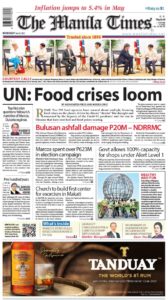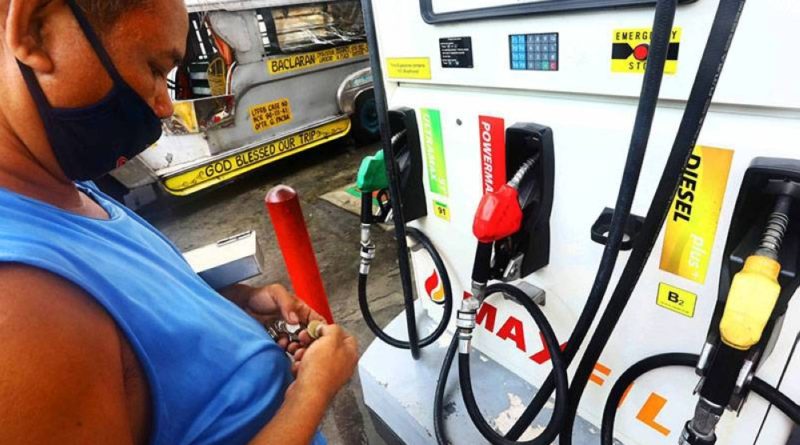HEADLINE | ROME: UN: Food crises loom

ROME: Two UN food agencies have warned about multiple, looming food crises on the planet, driven by climate “shocks” like drought and worsened by the impacts of the Covid-19 pandemic and the war in Ukraine that have sent fuel and food prices soaring.
The glum assessment came in a report by two Rome-based food agencies: the World Food Program (WFP) and the Food and Agriculture Organization (FAO).
WFP Executive Director David Beasley said besides hurting “the poorest of the poor” the global food crises threaten to overwhelm millions of families who are just getting by.
Memento Maxima Digital Marketing
@[email protected]
SPACE RESERVE FOR ADVERTISEMENT
“Conditions now are much worse than during the Arab Spring in 2011 and 2007-2008 food price crisis, when 48 countries were rocked by political unrest, riots and protests,” Beasley said in a statement. He cited as “just the tip of the iceberg” food crises now in Indonesia, Pakistan, Peru and Sri Lanka.
Memento Maxima Digital Marketing
@[email protected]
SPACE RESERVE FOR ADVERTISEMENT
The report calls for urgent humanitarian action to help “hunger hotspots” where acute hunger is expected to worsen over the next few months.
The UN agencies are also warning that the war in Ukraine, which was invaded by Russia in February, has exacerbated already steadily rising food and energy prices worldwide.
“The effects are expected to be particularly acute where economic instability and spiraling prices combine with drops in food production due to climate shocks such as recurrent droughts or flooding,” the joint statement from the UN agencies said.
Among critical areas cited is East Africa, where the United Nations said an “unprecedented” drought is afflicting Somalia, Ethiopia and Kenya. South Sudan, meanwhile, faces a fourth straight year of large-scale flooding.
The report cited other sobering climate impacts: Above-average rain and a risk of localized flooding in the Sahel, a vast swath of Africa stretching south of the Sahara Desert.
It also cited a more intense hurricane season in the Caribbean and below-average rainfall in Afghanistan. That Asian country is already suffering through multiple seasons of drought, violence and political upheaval, including after the return of Taliban rule last summer.
The report tagged six nations as “highest alert” hot spots facing catastrophic conditions: Ethiopia, Nigeria, South Sudan, Yemen, Afghanistan and Somalia. It said as many as 750,000 people are facing starvation and death in those countries. Of those, 400,000 are in Ethiopia’s embattled Tigray region — the highest number on record in any one country since the 2011 famine in Somalia, the UN agencies said.
In April, according to a study by regional health officials that was seen by The Associated Press, at least 1,900 children under five died from malnutrition in the Tigray region. Western Tigray, which is under the control of forces from the neighboring Amhara region, was not included in that survey.
The UN food agencies report Monday said Congo, Haiti, the Sahel region, Sudan and Syria remain “of very high concern” and noted that Kenya was a new entry to that list.
Joining the list of hot spot countries were Sri Lanka, Benin, Cape Verde, Guinea, Ukraine and Zimbabwe, while areas that faced continuing food scarcities included Angola, Lebanon, Madagascar and Mozambique.
P20 per kilo of rice ‘possible’
Despite the UN warning, the Magsasaka Party-list group in the Philippines is confident that President-elect Ferdinand “Bongbong” Marcos Jr. can achieve his campaign promise of lowering rice prices to P20 per kilo.
Rep. Argel Joseph Cabatbat said the goal was feasible for as long as “suitable and timely agriculture plans are implemented.”
Cabatbat, who is serving a second term, said that the government must provide adequate support to Filipino farmers, such as substantial budget allocation to guarantee adequate infrastructure and primary services, as well as reduce the cost of production brought about by the price of fertilizers and irrigation.
He cited rice-exporting countries like Thailand and Vietnam whose governments have been completely supportive.
Cabatbat said the Filipino farmers’ skills to deliver “low-cost, high-quality rice” should not be underestimated.
“We will reform the policy and the Department of Agriculture will nominate pro-farmer officials if they have support so that we can reach the P20 per kilogram of rice target,” Cabatbat said.
The lawmaker also cited the “megafarm” concept of Department of Agrarian Reform Secretary Bernie Cruz and Nueva Ecija Gov. Aurelio Umali.
Memento Maxima Digital Marketing
@[email protected]
SPACE RESERVE FOR ADVERTISEMENT
.
A mega farm is a cluster of adjacent farms that form a big plantation capable of producing a large amount of agricultural goods to fulfill customer demand.
“If we can reduce the cost of production and eliminate the middlemen, farmers may be able to earn more money without compromising consumer needs,” Cabatbat said.
He also urged the government to review the Rice Tariffication Law and implement food sovereignty because of the Philippines’ dependence on agricultural imports.
Marcos, in a statement over the weekend, vowed to boost the agricultural sector to ensure food security in the country.

Ads by: Memento Maxima Digital Marketing
@[email protected]
SPACE RESERVE FOR ADVERTISEMENT










